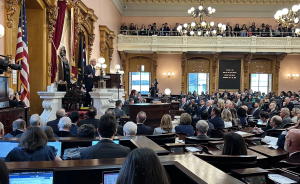COLUMBUS, Ohio (Statehouse News Bureau) — On Sunday, Gov. Mike DeWine signed the two bills that resulted from the special session that he called for. One bill will change the state’s 90-day candidate certification deadline so President Biden will be on Ohio’s fall ballot and the other will ban foreign nationals from contributing to ballot issue campaigns.

All Democrats voted against HB 1, which they said put too much enforcement power with the attorney general, a partisan elected official. And they noted it doesn’t address dark money from all sources, and they say instead, it seeks to put up obstacles for the redistricting ballot issue this fall.
‘It seems as though the only time we act is to change the rules of the game to benefit power-hungry politicians that are up against the will of the voters,” said Rep. Bride Rose Sweeney (D-Westlake) in the House floor debate.
The Biden ballot fix was House Bill 2, which moves the candidate certification deadline from 90 days before the election to 65 days.
The deadline has been moved for three of the four presidential elections since it was created in 2010. The deadline was moved for the elections in 2012 and 2020 because both parties had conventions after it. This time only the Democrats were affected, with the national convention set for Aug. 19-22, well past Ohio’s Aug. 7 deadline.
For weeks, Republicans including House Speaker Jason Stephens and Senate President Matt Huffman (R-Lima) said Biden would be on the ballot, though it was unclear how as no legislation had been proposed. A provision to change the deadline was added to a bill that passed the Senate May 8, but the language in the foreign money ban that was added to that bill led to all Democrats opposing it. It wasn’t taken up in the House.
After Friday’s session Huffman said the bill was still needed, even though the Democratic National Committee said Biden will be nominated virtually before Ohio’s deadline.
“I don’t know if they’ll have the virtual meeting. Sometimes people say they’re going to do things and then they don’t,” Huffman said. “It should be done legislatively.”
House Minority Leader Allison Russo (D-Upper Arlington) said she’s not sure why the virtual roll call wasn’t proposed by the DNC right after Democrats were notified by Secretary of State Frank LaRose of the conflict with the deadline in April. But she noted there are 49 other states plus additional rules to consider.
“It’s not as easy as just flipping a switch,” Russo said after Thursday’s House session. “Certainly I would have loved for it to have been sooner, but it is what it is. And we move forward with that. And I’m glad that we’re actually going that route.”
Sen. Bill DeMora (D-Columbus) noted on the floor that the party in power holds its convention after the other party, and the Olympics broadcasts are a consideration in setting a convention schedule. He had suggested an amendment to permanently set the deadline at 60 days before election day or three days after the end of the presidential party’s convention. That amendment wasn’t considered.
Russo and other Democrats have pointed out that the legislature in Alabama, which is larger and has more Republicans than Ohio’s, voted unanimously to change its certification deadline in early May.
Nearly a third of all Republicans in the Ohio legislature – 31 House Republicans and one Republican senator – voted against the measure to ensure Biden is on the Ohio ballot this fall. Though former President Trump won Ohio both years he was on the ballot, a total of 2,679,165 Ohioans voted for Biden in 2020, and 461,558 Ohioans voted for Biden in the Democratic primary in March.
Huffman and others have said they support a permanent deadline change. Senate Democrats sponsored a bill to do that in this special session, but its future is unclear.

